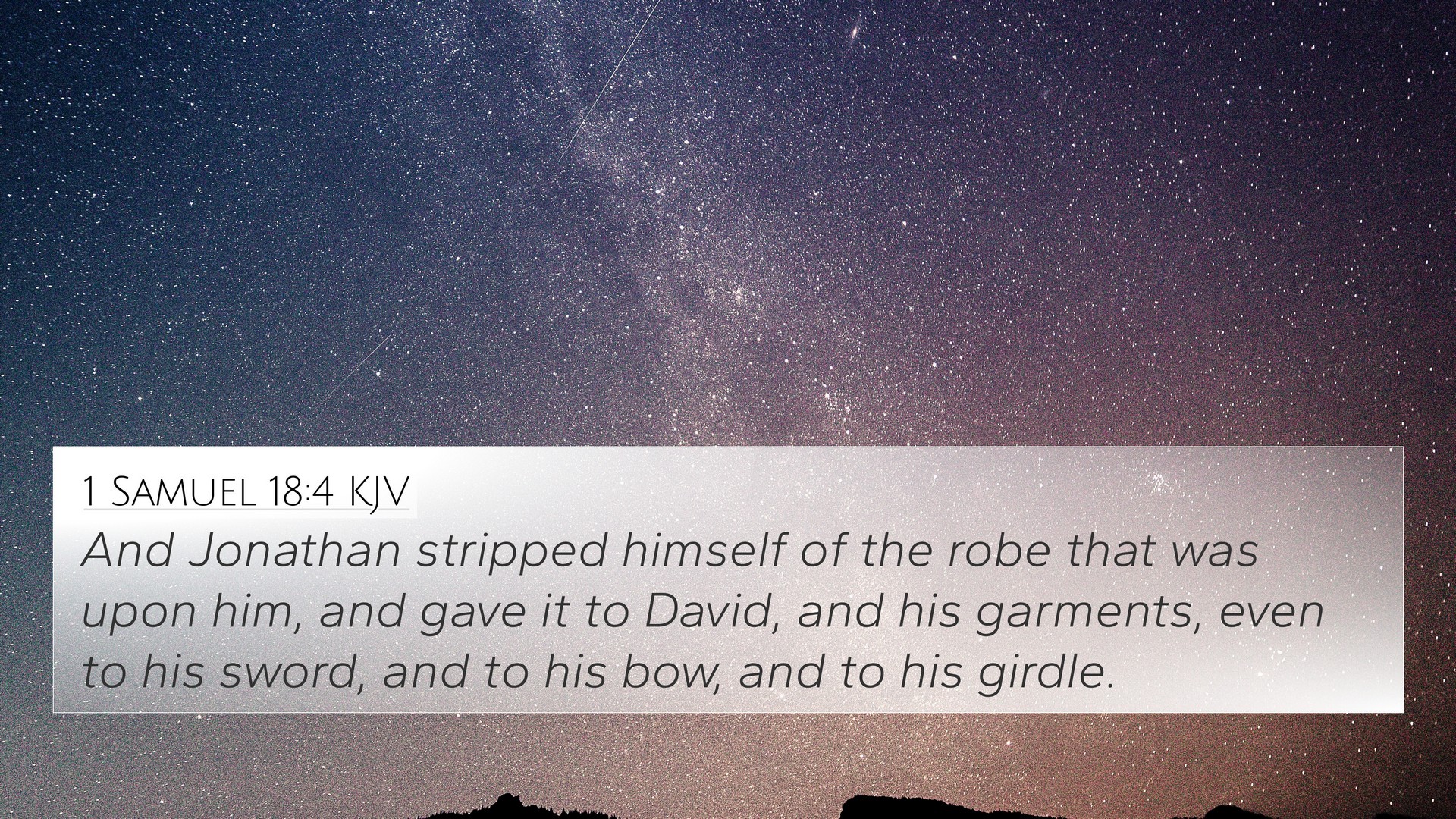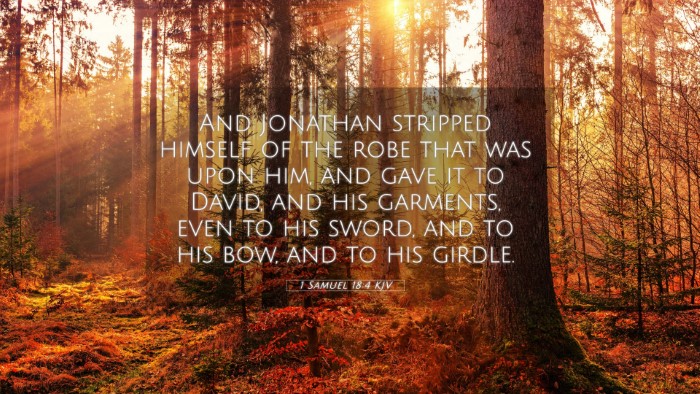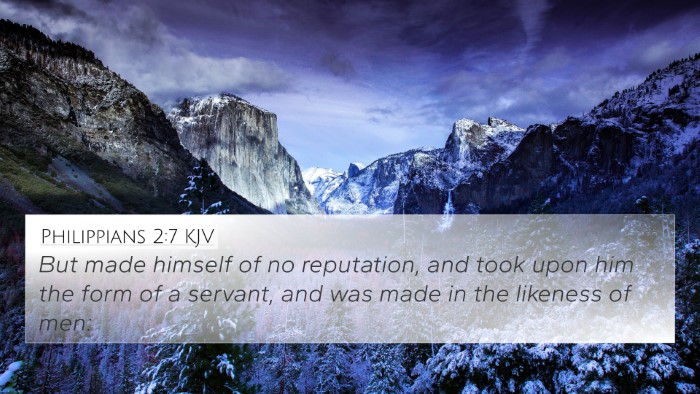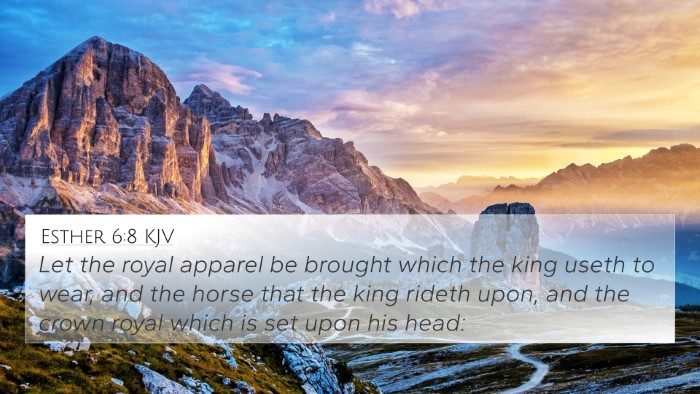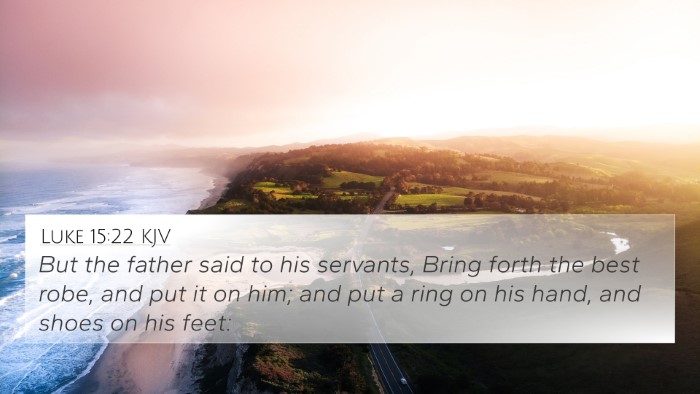Understanding 1 Samuel 18:4
In 1 Samuel 18:4, we find a pivotal moment in the narrative of David and Saul, where Jonathan, Saul's son, makes a profound gesture of friendship and loyalty. The verse states: "And Jonathan stripped himself of the robe that was upon him, and gave it to David, and his garments, even to his sword, and to his bow, and to his girdle."
Verse Meaning Summary
This action is rich with meaning, reflecting the deep bond of friendship between Jonathan and David, as well as Jonathan’s recognition of David’s future as the anointed king of Israel. The stripping of the robe signifies the transfer of royal privilege and status, while the gifts of armor and weaponry symbolize Jonathan’s acknowledgment of David's strength and potential as a leader.
Commentary Insights
-
Matthew Henry's Commentary:
Henry highlights Jonathan’s selflessness and noble character. By giving David his royal attire and weapons, Jonathan demonstrates his loyalty and support, fully aware that David would eventually take the throne, thus signifying the relinquishment of his own claim to the kingship.
-
Albert Barnes' Notes:
Barnes points out that this act of giving establishes a covenant relationship between the two men. It illustrates the idea of friendship shaped by a divine purpose, contrasting with the animosity that would develop from Saul toward David as jealousy took hold.
-
Adam Clarke's Commentary:
Clarke elaborates on the significance of Jonathan’s armaments as representations of strength and leadership. The act can be viewed as prophetic in nature, a foreshadowing of David's future role as king. Jonathan’s actions encapsulate both humility and an understanding of God’s sovereignty in choosing David as king.
Cross-References
Understanding the connections between this verse and others can deepen insight into the themes of friendship, loyalty, and divine purpose. Here are some relevant cross-references:
- 1 Samuel 20:16-17: The covenant of friendship established between David and Jonathan.
- 2 Samuel 1:26: David’s lament for Jonathan, expressing deep sorrow over the loss of his friend.
- 1 Samuel 23:17: Jonathan reassures David of his future as king, further solidifying their bond.
- 1 Samuel 19:1-2: Saul's intent to kill David, highlighting the perilous circumstances of their friendship.
- 1 Kings 8:19: The prophetic fulfillment of David's kingship, grounded in his relationship with Jonathan.
- Matthew 10:37: Jesus’ teaching on loyalty and relationships, echoing themes of sacrifice in friendship.
- John 15:13: The supreme example of love and sacrifice, tying to Jonathan’s actions for David.
Theological Themes
Several themes emerge from this verse that resonate throughout the Bible, including:
- Friendship and Loyalty: The bond between Jonathan and David serves as a framework for understanding true friendship, often discussed in the context of Christ's ultimate sacrifice.
- Divine Providence: God’s plan unfolds through seemingly mundane human relationships, as evidenced by Jonathan’s support of David.
- Role of Kingship: Jonathan’s renunciation of his royal garments prefigures the transition from Saul’s reign to David’s, illustrating God’s choice over human expectation.
Bible Study Tools
To explore these connections and themes further, utilizing tools for Bible cross-referencing can enhance understanding:
- Bible concordances to find related verses.
- Bible cross-reference guides to aid in thematic studies.
- Online resources dedicated to cross-referencing biblical texts.
Conclusion
1 Samuel 18:4 is not just a simple act of friendship; it’s an illustration of loyalty, divine choosing, and the interwoven narratives of Scripture that highlight God’s redemptive plan through human relationships. By examining the connections between Bible verses, one gains deeper insight into the heart of God's Word and the timeless principles of loyalty and friendship.
Engaging in a comprehensive Bible cross-reference study can illuminate these themes and provide valuable insights for personal reflection, teaching, or sermon preparation.
